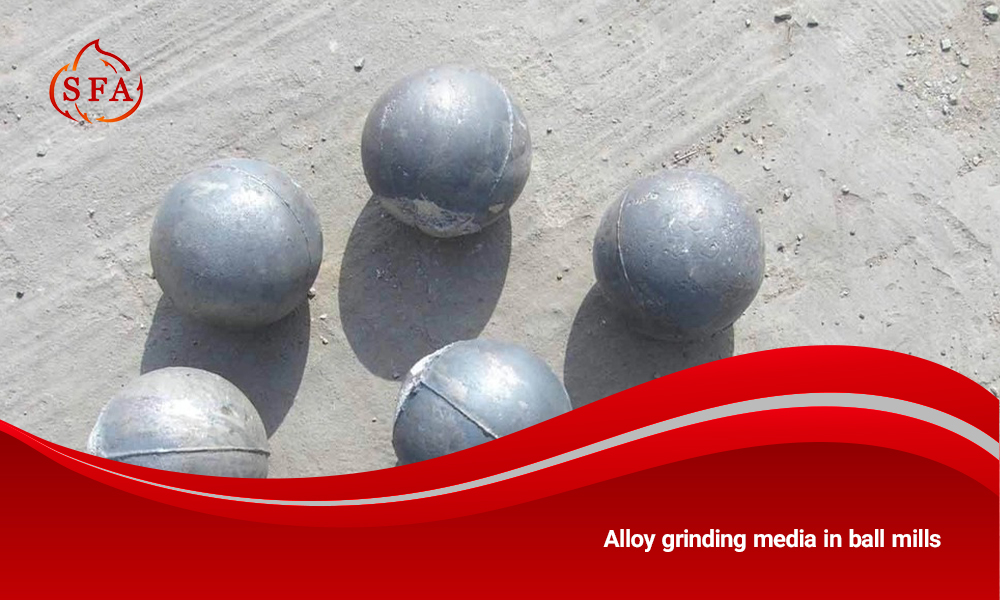

Benefits of Difference between steel and ceramic grinding balls
In the mining and cement industries, alloy grinding media in ball mills are a key component in material grinding. These balls enter the ball mill and crush the raw materials for use in the next processing stages. The quality and specifications of the grinding balls directly affect mill efficiency, product quality, and operating costs. Selecting alloy balls with the right specifications is therefore crucial for the productivity of mines and cement plants. This article, Benefits of Using Alloyed Grinding Media in Ball Mills, explores the advantages of alloy balls and highlights the industrial experience of Sepahan Foolad Atashgah Company in Iran.
Alloy bullets: definition and types
Alloy balls are those types of grinding balls that are made from special alloy steels and have metallic elements such as chromium, manganese, nickel or silicon in their composition. These metallic elements increase the hardness, impact resistance and wear resistance of the balls. Common types of alloy balls include:
- High Chromium Steel: These balls contain a high percentage of chromium (usually between 12 and 25 percent). Chromium causes the structure of the steel to become martensitic and create very high hardness. High chromium balls usually have excellent wear resistance and are also resistant to chemical corrosion.
- High Manganese Steel: These alloys contain about 12 to 14 percent manganese. High manganese steel has the property of becoming harder when ground (it is work hardening) and therefore has high impact resistance. These balls are suitable for conditions where the possibility of fracture due to impact is high.
- Special Alloys: Companies such as Sepahan Foolad Atashgah may produce special types of alloy bullets with proprietary compositions. For example, chromium-nickel-aluminum or chromium-cobalt alloys may be used in special conditions (such as high-temperature or high-pressure mills). In some cases, bullets with tungsten cores or ceramic materials are also included in the category of special alloy bullets, which have exceptional wear resistance.
Technical advantages of using alloy bullets
The use of alloy mill balls offers several technical advantages over plain steel or cast iron balls. The most important of these advantages are:
1. High abrasion resistance:
Alloy balls, containing chromium and other hardening elements, achieve very high hardness—about 55–65 HRC or more. This hardness leads to a significant increase in their resistance to abrasion. In practice, alloy balls consume 20–50% less per ton of production than plain steel or cast iron balls. Lower ball consumption reduces purchase and transportation costs and decreases the time spent on replacements.
2. Reduced breakage and production stoppages:
Alloy balls have better toughness than plain steel and cast iron balls due to their chemical composition and controlled manufacturing process. Therefore, the possibility of cracking or chipping during operation is reduced. Reduced ball breakage reduces the need for sudden mill stops to replace broken parts and improves production line productivity. As a result, mill downtime and emergency repair costs are reduced.
3.Improved mill efficiency and energy savings:
The quality of the ball mill has a direct impact on grinding efficiency. When the balls have higher abrasion resistance, the effective contact surface with the material increases and the grinding operation is more uniform. This improves the operation of the mill (reducing mill load fluctuations and maintaining production capacity). Also, by improving the grinding process and moving the balls more efficiently in the mill, energy consumption is lower than when using conventional balls. In the cement and mining industries, every percentage reduction in energy consumption can create significant savings in operating costs.
4. Difference between steel and ceramic grinding balls, Reduced ball consumption and maintenance costs:
Increasing the useful life of alloy balls directly leads to a reduction in the number of ball replacements. For large industries, frequent replacement of balls requires, in addition to the cost of new materials, mill shutdown and manpower for replacement. Therefore, by using high-quality alloy balls, maintenance cycles and costs associated with unplanned stops are significantly reduced. This is economically very important for technical managers because the maintenance cost due to ball consumption is considered part of the plant overhead costs.
Click to read the article «What makes a ball mill grinder more efficient?».
5. Reduction of final product contamination:
The lower the wear of the balls, the less iron and other metal impurities are released into the crushed product, such as stone powder or cement. This is crucial in cement production, as iron content in the clinker affects color and chemical properties. Alloy balls with high wear resistance minimize iron contamination and enhance the final product quality, including the Fe₂O₃ content in cement. Comparison of alloy bullets with plain steel and cast iron bullets
Compared to plain steel and cast iron balls, alloy balls have distinct advantages that are reflected in the performance-cost chart:
Longer service life
Alloy balls typically last more than twice as long as cast iron and plain steel balls. For example, in a cement mill, a high manganese steel ball may last 1.5 to 2 times as long as a cast iron ball, and a high chromium ball may last up to 2.5 times as long.
Higher fracture toughness
Although alloy balls may cost more than plain steel balls, their longer lifespan and fewer replacements lower the total cost of ownership (TCO). Unlike cast iron, which is very brittle, alloy balls do not splinter, and their service life is extended.
Economical
Although alloy balls may cost more than plain steel balls, their longer lifespan and fewer replacements lower the total cost of ownership (TCO). Also, by reducing replacement and repair stops, the opportunity cost of lost production will be lower.
Stable production quality
With the longer life of alloy balls, the mill can be kept in optimal condition (useful life) for longer. Therefore, product quality variations (due to sudden wear of the balls) are reduced. This process stability is important for factories with strict quality standards.
The role of alloy bullets in increasing the productivity of production lines
The use of quality alloy balls in cement production lines and mineral processing plants leads to a tangible increase in productivity. As follows:
Reduced maintenance stops: As mentioned, the longer life of the balls and their high resistance to breakage reduce the number and duration of annual maintenance stops. This directly increases the useful operating time of the mill and, as a result, increases annual production.
Stability in production capacity: After ball replacement or repair, the grinding system takes some time to reach stability. The use of alloy balls that require fewer replacements ensures that the system always remains in the optimal operating range and production capacity fluctuations are reduced.
Energy savings: Using the right balls makes mill operations more uniform and directs energy more efficiently toward grinding. It also reduces broken metal particles, lowers unwanted friction inside the mill, and helps cut energy consumption.
Increased life of other components: Better ball efficiency can have a positive impact on other mill equipment. For example, when the mill uses its energy to grind the material rather than compensate for rapid wear of low-quality balls, it reduces the risk of motor overload or screen damage. This also lowers the mill’s overall maintenance costs.
Successful experiences of Sepahan Foolad Atashgah
Sepahan Foolad Atashgah Company, a leading alloy steel supplier in Iran, has extensive experience producing and applying high-quality alloy balls across industries. The results of the company’s field observations and collaborations include the following:
- Yazd Cement Project: In an industrial development project with one of the country’s largest cement factories, after replacing old steel bullets with high-chromium bullets produced by Sepahan Foolad Atashgah, the useful life of the bullets increased by more than two times. This significantly reduced maintenance downtime and increased daily cement production capacity.
- Mineral Processing Plants: In iron ore mines and processing units, the use of Sepahan Foolad Atashgah Company’s high-manganese bullets improved the impact resistance and life of the bullets. For example, in one of the mines in Khorasan Razavi, it was reported that after using the new alloy balls, the monthly ball consumption was reduced to half of the previous amount and maintenance costs were significantly reduced.
- Technical Support and Training: In addition to supplying alloy balls, Sepahan Foolad Atashgah provides its customers with its experiences and employs its technical experts to adjust the grinding process and select the most suitable type of ball. This has allowed the contracting factories to quickly see a return on investment in improving the quality of the balls.
Conclusion and recommendations
Finally, using alloy grinding balls, especially in heavy industries like mining and cement, is a strategic choice with significant economic benefits. Their special metal composition greatly reduces common problems of regular balls, such as rapid wear, frequent breakage, and product contamination. It is recommended for technical and purchasing managers of Iranian factories:
- When choosing grinding balls, consider not only the initial price but also their lifespan, strength, and efficiency.
- If possible, conduct field experiments and tests with alloy balls to measure their economic effects in real conditions.
- Leverage the expertise of companies like Sepahan Foolad Atashgah, specialists in alloy ball production, and obtain technical guidance.
Considering the above, industrial managers can gradually replace old mill balls with alloy grinding media in ball mills. This helps increase productivity, reduce production and maintenance costs, and boost factory competitiveness. For more information and a pre-invoice, please contact our colleagues in the group and the commercial manager. Contact our colleagues and Commercial Manager for more advice and information.


